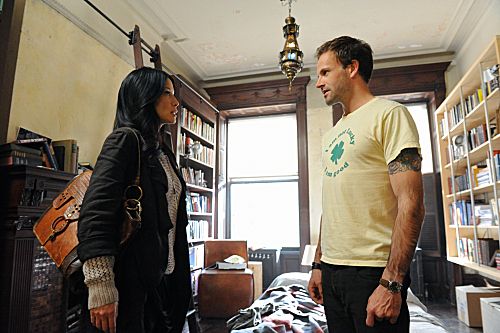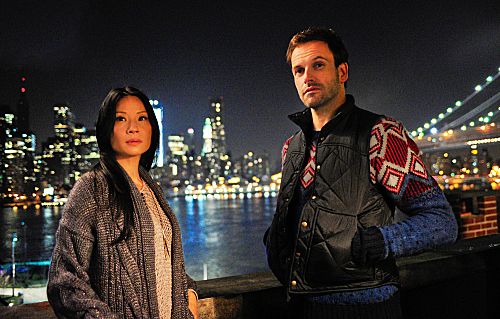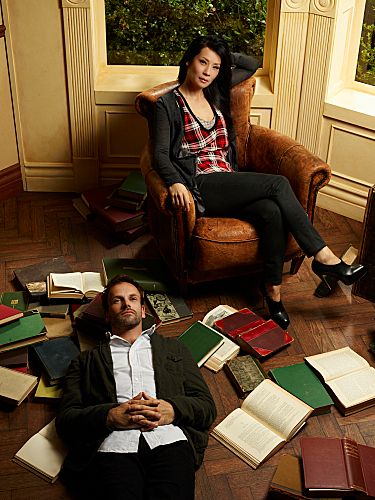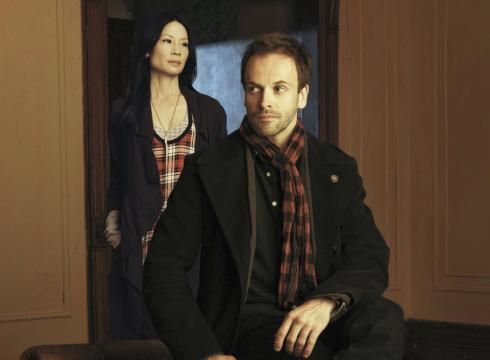At last, after much discussion and speculation, CBS's Elementary, a modernized adaptation of Sir Arthur Conan Doyle's classic Sherlock Holmes stories, has arrived. Much of the discussion revolved around the fact that the series has come pretty swiftly on the heels of the BBC's hugely successful Sherlock, that also offers a modern take on the tales, which has aired here in the U.S. on PBS. The other point of contention was the changing of Sherlock's companion Watson from John to Joan, a decision that at first made Sherlock fans everywhere groan due to the expectation of a prolonged "will they won't they" story line (Doyle would likely be spinning in his grave at the thought). Still, those connected with the show assured everyone that there would be no romance between the two leads (though if it lasts for several seasons we'll see if they keep to that promise). For now the big question is how this series compares to its British brother, and either way, whether or not it stands on its own. For that, hit the jump.
The success of any Sherlock adaptation rests almost entirely upon the man chosen to carry the name. The tall, handsome Basil Rathbone and his deerstalker cap set in the Victorian age (and later, fighting Nazis!) is what most of us Sherlock fans would default to when thinking of the brilliant detective, at least B.C. (Before Cumberbatch). Robert Downey, Jr.'s portrayal in the recent movie series became a less regal and punchier version, but remained charmingly maddening, which is the core of what any decent Sherlock should achieve. Benedict Cumberbatch, of course, defined the new Sherlock of the modern era. He had elements of Rathbone's debonair attitude but with a healthy dose of punch, and has been aided fantastically (as, again, all the best Sherlocks are) by a lovable Watson, played there by Martin Freeman.
Johnny Lee Miller is the newest of the Sherlock clan -- he's still British, though has transplanted to New York. His Sherlock has tattoos and a revulsion to sex though he still partakes (and, Watson believes, he doth protest too much about it). He's as sharp and as weird as any of the modern Sherlocks, and manages to maintain the right mix (so far) of being both charming and maddening. So far, he's great.
So let's move on to Watson -- Miss Watson, or Joan, played by Lucy Liu. The twist in this latest adaptation is that Watson is Sherlock's sober companion after a stint in rehab for an unnamed and unexplained drug addiction. Miller and Liu have affable chemistry, though nothing of that shared between Cumberbatch and Freeman. One of the best episodes and sequences in the BBC's Sherlockseries is in its Pilot, with how Sherlock and Watson came together. The "will they won't they" isn't romantic of course, so it's instead played for laughs, though has real emotion at its core. They need each other, that is plain. Miller and Liu's duo don't seem to need each other so much as that they are bemused by each other's existence enough to form a tenuous bond. Sherlock refers to her as his "personal valet," a great dig, but that joke has probably already been dropped since Joan has proved herself a worthy investigator.
Miller's Sherlock is brilliant, but some mental weaknesses have already been shown and exploited. He's not quite as uncommonly brilliant as Cumberbatch's Sherlock, who never makes a move that isn't part of some grander plan. Miller's Sherlock is prone to fits of senseless rage which, along with tattoos, is a strange departure for the character. It does make this Sherlock a bit more human than some of the other versions, but isn't part of our attraction to the character his nearly superhuman mind?
Rounding out the cast is the police friend of Sherlock's who goes by many names in many series -- this time he's Tobias Gregson (Aidan Quinn), and like most of the other detectives based on Lestrade he both trusts and is annoyed with Sherlock, while Sherlock uses the Lestrade character to access police intelligence he would otherwise not be able to get. So far Gregson seems less bumbling and befuddled than some of his other series counterparts, but then again Elementary does have more of a serious tone to it.
One of the most magical parts of the BBC's Sherlock series is its stylization. From the opening credits to showing us visually how Sherlock's mind works, the camera whizzes through scenes (particularly those specifically related to the procedural aspects) with astonishing speed. Elementary uses technology, too -- Miller's Sherlock is addicted to his phone -- but it doesn't let us in on things as much as the BBC's Sherlock, which floats text dialogue and computer searches on the screen for us to see as well.
Elementary began in a promisingly stylish way in the way it opened with the murder, and I had hopes that it might continue in those hyper-visuals throughout. Sadly it was quickly dropped for more pedestrian framing and exposition, which is a shame. Elementary can stand on its own and does, but to elevate it from all of the other police procedurals that CBS has in its wheelhouse, it would have been nice if it had employed something to make it stand out visually.
It's difficult to talk about Elementary on its own terms and not compare it to Sherlock, but hopefully the CBS version will find ways to come out from the BBC's shadow. So far it's a entertaining hour that may not feel fresh, but is enjoyable. It's worth giving it a few more weeks to develop, anyway, and see where it goes.
Episode Rating: B+
Musings and Miscellanea:
-- I think that CBS missed a fantastic opportunity to go beyond making Watson a woman and have her been gay as well. How many lesbians are prominently featured on broadcast TV or, heck, even cable, that aren't just the brunt of a joke? White gay men are the new default, but it wouldn't make sense to have Sherlock be gay -- Sherlock has always been more or less asexual (and one wonders if the woman Watson thinks crushed him in London is perhaps The Woman -- Irene Adler). It would have been bold, but it would have made things a lot more interesting.
-- Though Sherlock's father wasn't mentioned by name in the Pilot, it's my understanding that they've changed Mycroft from brother to father. I can see how it could work in such a context, but it changes the dynamic drastically ... for better or worse we have yet to see.
-- "Just read a book won't you??" - Sherlock to Watson in a conversation where he mentioned the name of the show in the dialogue, which always makes me facepalm.
-- I'm guessing Sherlock is bankrolled by his pops since he works for free as a consultant. What a life, follow your whims!
-- The crime plot was ok, I don't know anyone who didn't suspect the husband was involved from the start. A convenient twist at the end, hopefully the future crimes are a little more interesting.
-- I loved Sherlock predicting the baseball game, though that was the second time he appeared to be clairvoyant instead of just the master of deduction. He has a superhuman mind but he's not supernatural!





